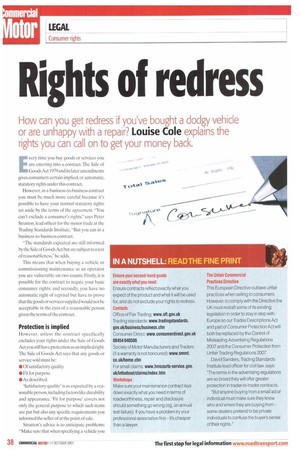Rights of redress
Page 38

Page 40

If you've noticed an error in this article please click here to report it so we can fix it.
How can you get redress if you've bought a dodgy vehicle or are unhappy with a repair? Louise Cole explains the rights you can call on to get your money back.
Every time you buy goods or services you are entering into a contract. The Sale of Goods Act 1979 and its later amendments gives consumers certain implied, or automatic, statutory rights under this contract.
However, in a business-to-business contract you must he much more careful because it's possible to have your normal statutory rights set aside by the terms of the agreement. "You can't exclude a consumer's rights," says Peter Stratton, lead officer for the motor trade at the Trading Standards Institute. "But you can in a business-to-business contract.
"The standards expected arc still informed by the Sale of Goods Act but are subject 11) a test of reasonableness," he adds.
This means that when buying a vehicle or commissioning maintenance as an operator you are vulnerable on two counts. Firstly, it is possible for the contract to negate your basic consumer rights: and secondly, you have no automatic right of reprisal but have to prove that the goods or services supplied would not be acceptable in the eyes of a reasonable person given the terms of the contract.
Protection is implied
However, unless the contract specifically excludes your rights under the Sale of Goods Act you still have protection as an implied right. The Sale of Goods Act says that any goods or service sold must be: • Of satisfactory quality • Fit for purpose • As described.
'Satisfactory quality' is as expected by a reasonable person,including factors like durability and appearance. 'Fit for purpose covers not only the general purpose to which such items are put but also any specific requirements you informed the seller of at the point of sale.
Stratton's advice is to anticipate problems: "Make sure that when specifying a vehicle you list your specific needs in writing. And ensure there is nothing in the contract that will make it hard to pursue a reasonable claim."
If you establish that there has been a breach of contract there are various remedies: • Refund, if the goods are rejected • Compensation; usually the cost of repair • Repair or replacement • Some money back Different laws apply to hire-purchase agreements and you will probably not get repair or money-back options. Make sure that your contract covers you against vehicle problems.
You must take up your dispute with the other party in the contract the dealer on purchasing a vehicle, or the manufacturer if it is a warranty issue. Guarantees, warranties and extended warranties are all in addition to your rights under the Sale of Goods Act.
There are other situations that affect your status under the Sale of Goods Act.
If you buy a second-hand vehicle, the expectations of satisfactory quality and so on inevitably decline. You are not covered if you buy from a private seller; the law reverts to caveat emptor ('let the buyer beware') so check carefully that the goods will match your need. However, even a private seller must describe the goods accurately.
When buying a vehicle or equipment at auction the Sale of Goods Act covers new goods or second-hand goods if you cannot be there in person and you may have recourse under the Unfair Contract Terms Act 1977.
If you have a problem, talk first to your seller; then tryTrading Standards or your professional association's arbitration service.
If you do decide to pursue legal action the small claims process has been speeded up and can be started online.There is a sliding scale of court fees and for a substantial claim you may wish to have legal representation which becomes expensive.
For further advice try your local Trading Standards Office. Consumer Direct is designed to offer consumer advice but some regional offices offer advice on trader-to-trader contracts at their discretion. •


































































































































































































